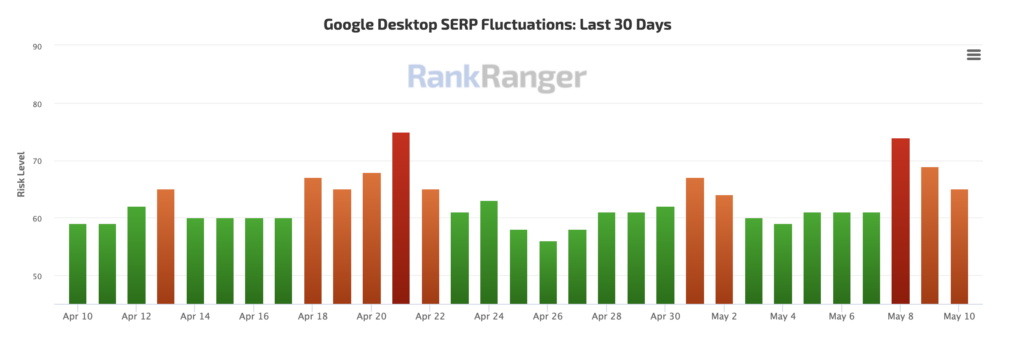
Another month, more SEO news and algorithm updates to keep track of. Read up here on the latest SEO news you need to know about.
Introducing Multisearch
One of the most talked about new items from Google is a tool called Multisearch introduced on April 7th. Essentially just like the name, it’s a way to search both with words and images. To make it work, you need the Google app on your phone, available for iOS or Android. Google says with Multisearch, you can use text and images at the same time. In the app, you click on the Lens camera icon then select a photo from your library or take a picture around you. From there, you can add additional text information like green dress or wallpaper to narrow it down further. Google says the tool also works to take a picture of a houseplant and search for care instructions. Then the search results will bring up results based on the image and any additional words you add in. Google is testing Multisearch in the U.S. with “the best results for shopping searches”.
This works through new AI in the Google algorithm and in the interface itself. It also is made possible through MUM, which is a new phase in the world of search. MUM means more conversational searches are possible with more relevant search results based around how people talk, not just the keywords they type.
So what does this mean for SEO? Essentially, it means the pictures you include on your website and in your content are just as important as the words you put on a page. Especially for eCommerce sites, you need to have robust meta data and alt text to describe an image so Google can understand what it is as it crawls your site. Your images should have keywords, product name, color, and more to help it be more relevant to these new kinds of visual and text-based searches.
 Removal of Personal Information on Google
Removal of Personal Information on Google
In another big move in the world of privacy, Google is allowing users to request to remove personally identifiable information from the SERPs. Things like your phone number, address, or email, sometimes even login credentials that can show up in the search results. Google says that as scammers and others on the internet are finding new ways to use personal information, they’re evolving their policy to help users take more control of what shows up online.
Previously, people could request the removal of things like bank account or credit card information. Now the policy extends out to other kinds of personal identifying information. Google says they’ve received feedback that people want to be able to remove these personal details like phone numbers to remove direct contact from unwanted sources. Google says they will evaluate all removal requests and the web page itself to make sure that they’re not removing information that is broadly useful, like in new articles. Also if the information is part of public record or government records, the information won’t be removed.
They also note that just because they remove the information from the SERP, doesn’t mean it’s gone from the internet. The information will still be available to users who click thru to that particular web page. In that case, you need to contact the hosting site directly where possible.
Google Releases Webspam Report
Google continues to wage its war against spam and the spread of misinformation through its platform. In April, Google released its annual Webspam report and the steps they’re taking to keep malicious content away from the SERPs. Google claims they caught 200 times more spam sites in 2021 compared to what they did 20 years ago. They use an AI-based system called SpamBrain that they continue to build and improve since its launch in 2018.
Google also identified a little more about what they consider spam with “hacked spam” (70%) and “gibberish spam on hosting platforms” (75%). Essentially this SpamBrain algorithm is able to identify “disruptive and malicious behaviors among billions of web pages” that allows them to keep over 99% of searches spam free.
To prevent spam is in Google’s best interest. They want to maintain their monopoly of the search game, and provide the best information that is not harmful or obnoxious to interact with. They want to avoid serving spam or scam links that will ultimately hurt the searcher and make the searcher lose trust. So as ScamBrain continues to evolve and Google continues to improve it, we’ll see a greater decrease in online harassment, for some name queries, and sites that directly exploit customer information and behavior. You can read their report here.
Reported Search Ranking Algorithm Updated on April 20th and 21st
While the last few monthly SEO reports have talked about a lot of updates, both confirmed and suspected, we only have one suspected update to mention for April. We saw a lot of chatter and fluctuation around rankings between April 20th and 21st. Likely meaning the algorithm was testing something, or a minor update rolled out that Google did not announce. Many SEOs noticed big swings in rankings from day to day. Tools on Semrush also show big spikes on those days as well, specifically on English-language websites. Because it’s unconfirmed, we can only guess what the focus was. But those sites with continued good content and SEO practices ended up more stable. See this graph of SERP volatility from RankRanger. (we’ll talk about that May 8th spike next month!)

Quality Content
I feel like I talk about this every month. But the importance of good content continues to come into play every single month. In April we had some additional clarifications from Google’s John Mueller during his SEO office hours.
The first content topic we want to mention comes from “thin content”, or content not very flushed out or detailed enough to attract the keyword. While you want every page on your website to rank high and be fully SEO optimized, Google actually can look at the content of your whole site and determine if it’s too thin, rather than page by page. Mueller said “So it’s not so much that one page doesn’t have enough content. It’s more that the website overall is very light on actual information.” Of course, Mueller is referencing a specific case brought up, but his comment should provide some idea as to how Google is looking at websites as a whole. This should also provide some motivation to make sure all pages have enough information on them.
In a different office set of office hours, someone asked Mueller specifically about WHO writes the content for your website. This is more specifically blog and other more long form content. He said that in the eyes of Google, it doesn’t matter. Whether it’s outsourced to a content writer, or an in house team. For Google, it’s all about the quality of it.
Potential Changes to Featured Snippets
Over the past couple years, there’s been a lot of talk around Featured Snippets, the People Also Ask section, or essentially what we’ve come to know as “position zero” of the SERPs. We’re actually seeing Google do some testing around the Featured Snippets and could be hinting at some big changes to come.
One of these changes includes From the web. While a normal snippet has a paragraph of information and a link to a site, From the web has a short excerpt from a few different websites and links to each one individually. Essentially giving more real estate to the Snippet with more chances to show up.
Google testing a new type of “From the web” box for product reviews. Desktop. Is this new? 🙂 cc:@rustybrick pic.twitter.com/4yvKGGYWSj
— Vlad Rappoport 🇺🇦 (@vladrpt) April 19, 2022
Another new test is Other sites say where Google then shows the results of three other sites beneath the normal paragraph-style snippet. Essentially giving you other options to go read more or validate the snippet result.
I’ve never seen this “other sites say” before. kinda cool. pic.twitter.com/pEwTTjs3bZ
— Sarah (she/her) (@SarahBlocksidge) April 19, 2022
Barry Schwartz reported on this in Search Engine Roundtable with a few other examples. But what this means for you is the potential for additional real estate in the highly-coveted position zero. It means more chances for your well-written and keyword optimized content to show up high in the search results, even ahead of the organic results. This is a great opportunity for your business and for brand building.
Concluding thoughts
As always, check back with us each month for a wrap of all the SEO news you need to know about and what it could mean for your website. But if you need help with your SEO or want to use Boostability’s SEO knowledge for your agency and clients, contact us! We’re the worldwide leader in white label SEO, and provide SEO to our partners worldwide to resell to their customers. Contact us today to get started.

